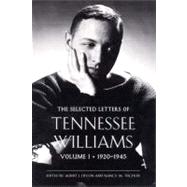Presented with a running commentary to separate Williams' sometimes hilarious (but often devious) counter-reality from truth, The Selected Letters, Volume I: 1920-1945 (which includes 330 letters out of nearly 2300 collected) has been meticulously edited by two of this country's premier Williams scholars. Alber








